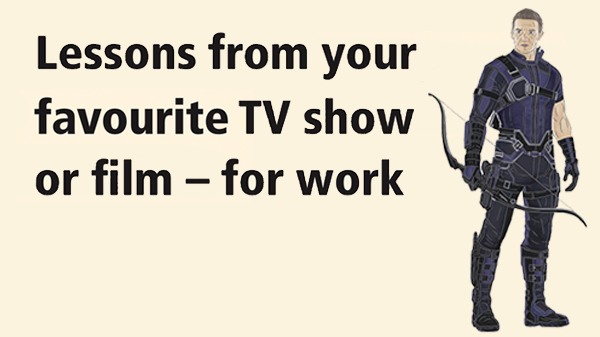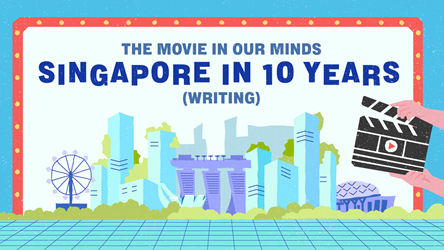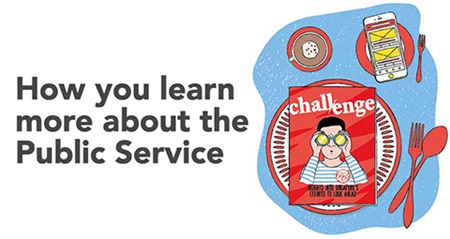Lessons from your favourite TV show or film – for work

With people having cameras on their smartphones and in vehicles, there are “eyes” everywhere. Is this better or worse for public officers, and why do you think so?
Send your entry to psd_challenge@psd.gov.sg.
The winning entry will receive a prize worth up to $100. All other published entries will win vouchers worth $30 each. Please include your name, agency email address, agency and contact number.
All entries should reach us by October 3, 2016.

Ian Leong, MOE
Here are some lessons I learnt from The Avengers movie series:
1. Invest in your interns. You never know if they’ll mess up everything. Case in point: The Scarlet Witch probably didn’t do Steve Roger’s career any favours when she blew the operation to high heaven in Captain America: Civil War. There’s a reason he’s still a Captain after all these years.
2. Even if you look like Jeremy Renner (Hawkeye), firing arrows around the workplace — also known as “arrowing” people — won’t make you many friends.
3. Sometimes technology can seem like it’s out to get you. If you’re Iron Man, it probably really is out to get you. But take heart: all is well if you keep your eyes on your Vision. If you don’t have a nifty cyborg to save you from the morass of Excel spreadsheets and blue screens of death, then a little re-Vision is probably your best bet.
Congratulations, Ian! You win a $100 iTunes or Google Play gift card to watch your favourite films or TV shows!
Loh Cher-E, URA
In an episode of The Flash, the Flash goes back in time to change events, but realises that everything goes wrong after he changes a simple event, due to the butterfly effect. Similarly, we sometimes push policies that don’t go well and wish to relaunch them, but we have to live with what we proposed, make the best out of it and rectify any mistakes made. You don’t need superpowers to solve a problem, you just need the will to make things right!
Matthew Chua, SCDF
My favourite TV show is Game of Thrones, which is about a few powerful families in a medieval world battling to claim the highest authority in the land. The poor and weak are used and abused by the rich and powerful. This show has highlighted that though the Lords may seem to perpetuate an all-mighty legacy, it is the small acts of kindness by ordinary people that can topple the powerful’s vainglory, and create hope for a better world for everyone, not just for a few Lords. In the same way, I understand that my work is not about climbing the “promotion ladder”, but working with others to build a more compassionate and gracious Singapore.
Gladys Tan, CNB
The Devil Wears Prada stars Anne Hathaway as naïve but hardworking Andy Sachs, who assists Meryl Streep’s Miranda Priestly, the powerful editor-in-chief of a high-fashion publication. There are countless career lessons but this is one of my favourite: Don’t expect to be praised all the time. In one scene, fashion assistant Nigel tells a crying Andy, who hasn’t received any recognition from Miranda: “So quit. I can get another girl to take your job in five minutes.” This scene taught me that complaining gets us nowhere. We just have to grit our teeth and figure out ways to overcome difficulties. If others can do it, so can we. Most importantly, we need to take pride in our work and be confident.
Gerald Lam, MOM
In the movie Peaceful Warrior, Dan is a college student who seems to have everything anyone could possibly want: the looks, attention from girls and a talent in gymnastics. Yet, he is unhappy and deeply troubled inside. Then, he meets a spiritual guide and learns that “A warrior is not about perfection or victory or invulnerability. He’s about absolute vulnerability. That is the only true courage.” We often look on the surface and rarely reverse our thinking to see how a “warrior” could be vulnerable. Likewise, it is easy to just follow standard procedures and instructions at work without stopping to evaluate problems with some reverse thinking processes. During brainstorming for example, instead of asking what a problem is and how to fix it, reverse brainstorming asks: “What causes the problem?” or “What achieves the exact opposite effect of what we’re looking for?” There might just be a better way or solution.
Yan Chui Ping, MND
The Butterfly Effect is about a man who goes back in time to fix his traumatic past, with unexpected consequences every time. He finally sees that he and his friends will never have good futures by fixing the past. The butterfly effect is a phenomenon where one small action (the flutter of a butterfly) can magnify into a huge consequence in the long run. Therefore, whenever we do a piece of work, it is good to think about and speak to any stakeholders involved to communicate our actions early, so that any small initial actions on our part will not turn into some detrimental big issues in the future, where more resources are needed to solve such problems.
Tan Hwee Yen, MOE
From Dead Poets Society: “I stand upon my desk to remind myself that we must constantly look at things in a different way.”
- There can be more than one way to solve a problem. Think out of the box!
- Do not label anyone as incorrigible or ”unteachable” because if you are willing to change your prejudice and look at others in a different light, you can see the good in everyone. Grades are not everything!
Tan Boon Leng, IDA
The King of Comedy (戏剧之王) is a ’90s comedy by Hong Kong actor-director Stephen Chow. The protagonist (played by Chow) worked for years at honing his acting craft but was pooh-poohed by naysayers. In spite of multiple setbacks, he did not give up and eventually got to channel his craft (acting as a deliveryman) by helping the police to nail down a notorious gang of robbers. The show taught me that it is important to have the confidence in your abilities, and to not be cowed in the face of setbacks. You may be a minion in the office, but if you continue to do your work competently and confidently, due reward will come to you.
Lin Peixin, NPTD
The original storyboard for Zootopia was for the predator characters to wear collars that would zap them if they get overly emotional, i.e., aggressive. However, the production team removed that after testing the concept as the collars made viewers immediately wary, and perhaps smug that they are not “racist” (“species-ist”?) like the animals in the movie. Rather, the production team wanted viewers to fall in love with Zootopia, only to reveal the unconscious discrimination that exists. By then, viewers would have to confront their desire for the ideals represented by Zootopia, and also their own unconscious biases in daily life.
This applies to our work in two ways — first, as public officers, we need to be aware of the underlying assumptions we hold about the behaviours of others that could lead to unintended policy biases. Second, when it comes to public education on norms and values, we have to move beyond portraying “obvious negatives” to enabling each of us as members of the public to reflect on deeply held stereotypes and unconscious actions.
The documentary Imagining Zootopia can be found on YouTube.
Deborha Daniel, NYP
One film that has influenced me a lot in life and in my work would be Dumbo. As a youth I often thought it would be nice to have someone who could understand my fears and encourage me to achieve my dreams. I had a few teachers who helped and influenced me a lot in life, but never one who made a mark on a personal level like Timothy does for Dumbo. As life progressed, I realised that I was never going to be Dumbo, but I could be Timothy Q. Mouse! I could be the enabler. I could be the person giving hope, dreams, future and positive encouragement to all the kids who did not have a way to control their fear, cope with stress and see their own potential.
So I became a teacher.
Mohamed Naguib Ngadnan, MOE
My favourite series growing up was Macgyver, with the titular character using a repertoire of everyday objects to help him overcome every mission — be it defusing a missile head, thwarting off the occasional bad guys, fixing a random kid’s bike or rescuing trapped survivors from a collapsed high-security facility.
As a teacher, it’s important for my students to know that they have the potential to overcome all odds and challenges life throws at them.
In one Form Teacher lesson, I showed my students an opening gambit (a stand-alone opening sequence in one of the episodes) entitled How To Use A Map, which showed how a humble map was used in various ways to get Macgyver out of a very sticky situation. Then I introduced the class to one of Macgyver’s most popular tool, a paper clip. We discussed the various ways a paper clip could be used. The class came up with many brilliant examples: the clip as a fishing hook, zipper alternative, cable organiser, etc.
At the end of the lesson, I gave all my 39 students a paper clip as a symbol and reminder that they have the potential in them to overcome all challenges. From that day on, I also made sure I “wear” a paper clip (discreetly: on my collar, folded sleeves, shirt pocket, tie, etc.) as a nod and assurance to my students that this is a belief that I still hold true.
- POSTED ON
Sep 1, 2016
-
Out of Office

The Perks of Not Being A Wallflower









